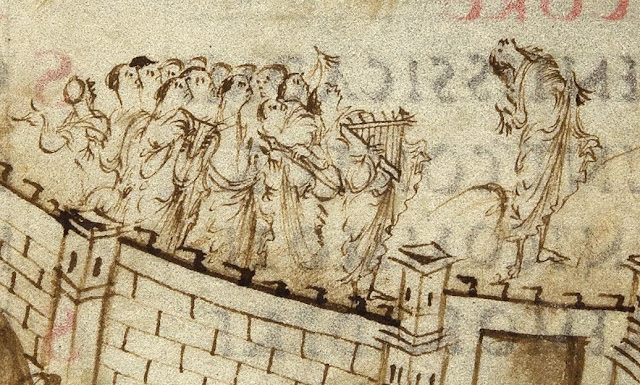If [you wish to give thanks] on the second day of the week, then [you have] Psalm 48.Athanasius, On the Interpretation of the Psalms
I was fascinated once I realized that this psalm is in praise of a place — Mount Zion — the hill on whic Jerusalem and the temple stood. Underlying all of this is the fact that praising the "city of God" is actually praising because this is where God is found. In a sense, this is the opposite of the story of the Tower of Babel because the people are not praising their own accomplishments, but the God who made it possible and his loving care.
 |
| Zion (1903), Ephraim Moses Lilien |
What does this offer for a Christian who is not oriented toward God in the way that the psalmist was? The Church Fathers look at the city as a way of life and at the temple as a symbol of Christ.
48:1 Great is the LordIn Our Lives. Theodoret of Cyr: Often the divine Scripture gives the name "city" not to the building but to the way of life. Accordingly, here too he says the Lord of all was shown to be great through the things done by him in connection with his city, which the elevation of its teaching rendered illustrious as though located on a lofty and mighty hill.Commentary on the Psalms
48:9 The Temple of GodChrist, the Temple. Ambrose: God's true temple is the body of Christ, and in that body lies the purificatoin of all our sins. Truly, that flesh is God's temple, and in it there is no contagion of sin. On the contrary, it was itself the sacrifice that takes away the sin of all the world. That flesh is indeed God's temple, and in it shone God's image. In it there dwelled the fullness of divinity in a bodily manner, for Christ is himself that fullness. ... In that temple, the psalmist tells us, "we have received your mercy." Just as Christ is redemption, so too he is mercy. No greater mercy can there be than that he should offer himself as a victim for our crimes. He sacrificed himself to wash the world clean in his blood, for in no other way could our sin be abolished.Commentary on Twelve Psalms
Both quotes from Psalms 1-50 (Ancient Christian Commentary on Scripture)






_-_Policarpo_de_Oliveira_Bernardes_(Igreja_da_Miserico%CC%81rdia_de_E%CC%81vora).png)











